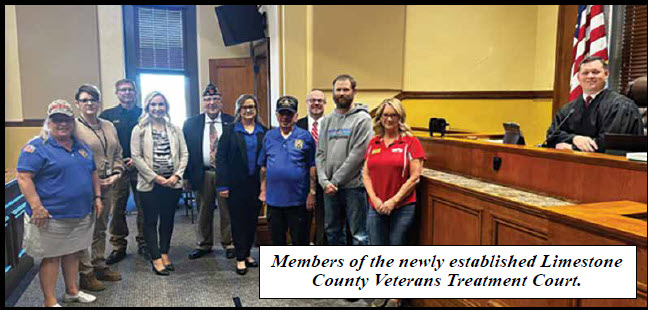 By: Sandra Erickson
By: Sandra Erickson
Life in the military can be tough, as military members and their families face difficult challenges and demands that strain even the strongest people. Unfortunately, many veterans find difficulties returning and reintegrating in civilian life. Like civilians, they commonly experience several significantly stressful events at once: moving to a new area, facing unemployment, and challenges finding stable housing. However, veterans transitioning to civilian life often have additional complications. They may return with serious health conditions such as post-traumatic stress, chronic pain, depression, substance abuse, and others. Some find ways to cope that increase the probability they will become involved in the criminal justice system, ranging from arrests to incarceration.
The Nation’s first Veterans Treatment Court (VTC) was established in 2008 in response to the growing number of veterans who were addicted to substances and suffering from mental illness appearing on the criminal dockets. Since that time, there have been hundreds more established in several states, including Alabama. The VTCs help rehabilitate non-violent veteran offenders while reducing the strains on the courts, corrections, and veterans. Through the VTC, veterans may receive mental health assessments, treatment, transitional services, and connections to needed veteran-specific support services.
A Veterans’ Treatment Court has been established in Limestone County, Alabama. Limestone County Community Corrections, AMVETS Post 21, Veterans of Foreign Wars, Disabled American Veterans, American Legion, Vietnam Veterans of America, along with judiciary and legal professionals, and veterans’ advocates have worked to establish a VTC to help our local veterans who are involved in the criminal justice system. Limestone County Veterans’ Treatment Court held its first hearing on November 13, 2023. By addressing the underlying issues faced by veterans, the Veterans’ Treatment Court aims to break the cycle of recidivism and provide a pathway for these heroes to rebuild their lives.
The VTCs are managed by volunteers and are estimated to save several thousands of dollars of the cost to house incarcerated inmates while still providing the rehabilitation goals sought through incarceration. According to the Department of Corrections, it costs $30,163 annually to house an Alabama inmate. This can translate into better savings to not only the taxpayer, but the local community and the state, as more participants graduate from the VTCs.
The Limestone County Veterans Treatment Court exemplifies our commitment to recognizing and supporting the unique needs of military veterans involved with the criminal justice system, offering hope and a second chance for those who have served our country, all while ensuring the needs of the veteran, the judicial system, and the local community are met with professionalism, precision, and dedication.
By: Sandra Erickson







